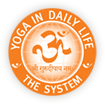 The practise of Yoga and its benefits physically, mentally, socially and spiritually, allows us to create harmony within ourself. When you start to feel this harmony your whole inner being revives like a desert after rain. Yoga and Meditation exerts a pleasant, harmonising and healing effect upon ones whole body and psyche. There comes to exist in one’s heart something so peaceful, which no one can ever take away.
The practise of Yoga and its benefits physically, mentally, socially and spiritually, allows us to create harmony within ourself. When you start to feel this harmony your whole inner being revives like a desert after rain. Yoga and Meditation exerts a pleasant, harmonising and healing effect upon ones whole body and psyche. There comes to exist in one’s heart something so peaceful, which no one can ever take away.
“May all beings be healthy
May all beings dwell in peace
May all beings attain oneness
May all beings attain fulfilment
May there be happiness in the whole world”
Yoga means more than doing a headstand or having a good figure. Though comprehensive as it is, yoga actually includes those things too. It is said “One in all and all in one.” The aim of yoga is discovering inner peace, inner harmony, realizing one’s true Self. For those who practise seriously it is for finding the answer to the question, “Who am I?” We suffer all kinds of stress because we don’t know who we really are. Finding out who we really are is the ultimate purpose of yoga.
We humans often feel ourselves weak and helpless. We think peace and happiness are far away and difficult to reach. But this peacefulness is Omnipresent, it exists within each of us as our true nature. So in meditation, always aim to develop uplifting and confident thoughts, because thoughts have great power and can achieve anything.
As we progress in meditation, the ability of spiritual perception develops. Mind and consciousness become the eyes of the Self (our true nature), as our spirit roams throughout the whole Universe (astral travelling). Just like the headlights of a car illuminate the street in front of us, so the spirit perceives all things and transmits this experience and knowledge to our consciousness. However, first we must recognise our Self in each living being, in every atom and in all planets and stars. This means that we must progress to such a degree, that we can identify ourselves with all beings and all things. We should not identify with philosophy, religion, nationality, gender or race, but discover the unity that transcends all external appearances.
Duality is prevalent in today’s world, but a wise person can recognise unity appearing in many different forms. When the wise one looks at two jugs in front of him, he is conscious that the clay from which they are made is the same. In this way the Self-Realised, the God-Realised, does not view the external form, but rather its inherent reality, the Atma, the Self.
It is not enough however to understand this intellectually, one must feel and experience this more deeply within. Once we have heard the call of the Soul, then we no longer desire any Siddhi (power) or miracle. We no longer need anything else in order to be happy. We don’t seek someone to extend a hand to us, rather we hold out a helping hand to others, because we know, "I am the Atma and this Self lives in others also. We are not two, but one. We may dwell in different bodies, but the body is transitory. Our reality exists in the unity that is immortal."
As long as we entertain thoughts of duality, thoughts of separateness, we make a grave mistake. We help ourselves the moment we overcome dualistic thoughts. Then we recognise that this world is simply a manifestation of our mind, that in reality, our mind has created the world as we see it before us. We realise that all of creation is changeable and transitory. Like waves on the ocean. In due time, all waves sink back into the ocean and unite with it. One day too, the world as we know it will vanish and all that we will see everywhere is God the Supreme, our Atma.
Therefore in meditation, practice Atma Chintan - know that you are strong, pure, happy and immortal. You are the Self! In the Self exist no fear, no sadness and no guilt. Worldly life is not to be condemned. After all, we dwell in this world and it provides us wonderful experiences. Therefore we should not make life difficult for ourselves, but rather enjoy life and be free from self-reproach, as we sincerely endeavour to remain on the right path.
Live now in the present. Do not brood about the past. Yesterday is gone and never again comes back. Also, do not dream about a "better" future. The future is still not here and we will never reach it, for the future is only ever the present. Tomorrow remains tomorrow, and the day after tomorrow always remains the day after tomorrow. Always live only in the now. When we are conscious of this we will have overcome time and live in its midst as the observer and witness of all change.
Our Atma is the Divine Self.
May all recognise this and offer their love.
More lectures by H.H. Vishwaguru Mahamandaleshwar Paramhans Swami Maheshwarananda can be viewed on swamiji.tv


 The foundation of Sanatana Dharma is YOGA. Yoga means UNITY, that is the union of the individual with the universal consciousness, and to practise Yoga means to tread the path to reunification of the individual with its origin – God.
The foundation of Sanatana Dharma is YOGA. Yoga means UNITY, that is the union of the individual with the universal consciousness, and to practise Yoga means to tread the path to reunification of the individual with its origin – God.



